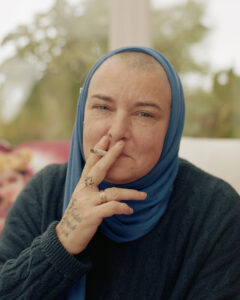 In the realm of solitude, Sinead O’Connor finds her refuge. As the pandemic’s veil enshrouded the world, the enigmatic songstress sought sanctuary atop an Irish mountaintop village. Amidst the verdant landscape, she cultivated a cocoon of vibrant hues that defied the monochrome skies. Bubble-gum roses adorned her windows, while the Hindu goddess Durga stretched her multi-limbed embrace on a cherry couch, all ensconced within a conservatory that seemed like a world unto itself.
In the realm of solitude, Sinead O’Connor finds her refuge. As the pandemic’s veil enshrouded the world, the enigmatic songstress sought sanctuary atop an Irish mountaintop village. Amidst the verdant landscape, she cultivated a cocoon of vibrant hues that defied the monochrome skies. Bubble-gum roses adorned her windows, while the Hindu goddess Durga stretched her multi-limbed embrace on a cherry couch, all ensconced within a conservatory that seemed like a world unto itself.
With a navy hijab elegantly draped over her shaven head and a cigarette perpetually nestled between her fingers, O’Connor’s presence felt like a testament to self-contained individualism. “I’m fortunate,” she mused, “for I relish my own company.”

Within the kaleidoscope of her cottage, O’Connor conveyed a sense of whimsicality, yet her mirthful countenance held deeper tales. A virtual tour, guided by her iPad, revealed the nuances. The blooms, it transpired, were ethereal replicas procured from Amazon. The exquisite velvet chairs, more objets d’art than seating, were deliberately chosen for their discomfort, a subtle way of declaring her preference for solitude.
Yet, her words were enlivened by a playful giggle, almost inviting company into her private domain. The allure of Sinead O’Connor remains, unapologetically irresistible.
A cherubic smile, an unfiltered tongue, and that unmistakable visage—O’Connor embodies familiarity. Eternally etched in pop culture memory, her presence defies oblivion. The poignant close-up in the “Nothing Compares 2 U” video, an enduring emblem of her stardom, lingers. Equally unforgettable is the audacious act on “Saturday Night Live,” where she tore a photo of Pope John Paul II, a pivotal moment that redefined her narrative. Yet, O’Connor reshapes this trajectory in her memoir “Rememberings,” asserting that tearing that image was her compass, realigning her course.
Her music transcended the charts, her voice a

An unapologetic punk protest singer, she soared to pop stardom, only to feel ensnared. The media’s scrutiny, misconstruing her nonconformity, cast her as eccentric. In her eyes, this was the paradox of pop stardom—a gilded cage. “Being a pop star is akin to imprisonment,” she asserted, “a mandate to be a ‘good girl.’” A mold Sinead O’Connor could never mold herself into.
In emotive conduit. “Nothing Compares 2 U,” her poignant rendition, brought her to global prominence. Yet, it was not just music, but also her defiant appearance—shaved head, unconventional wardrobe—that redefined femininity and sexuality’s paradigms in music.
O’Connor’s transformative journey led her to embrace Islam in 2018, becoming Shuhada Sadaqat, though retaining her iconic name. Her spiritual exploration mirrored her unyielding individualism, a path embraced despite its dissonance with prevailing norms.
 Her resonance, however, extends beyond the realm of art. O’Connor tore through cultural confines, sparking conversations about religion, feminism, war, and more. As she defied, she liberated. Even her polarizing act of tearing the Pope’s photo echoed societal shifts, a brave step away from the Catholic Church’s stronghold.
Her resonance, however, extends beyond the realm of art. O’Connor tore through cultural confines, sparking conversations about religion, feminism, war, and more. As she defied, she liberated. Even her polarizing act of tearing the Pope’s photo echoed societal shifts, a brave step away from the Catholic Church’s stronghold.
Today, we remember Sinead O’Connor—musician, maverick, and provocateur—as a symphony of paradoxes, a soul who etched herself into history by pushing against its confines.









